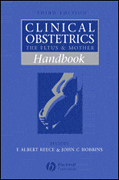The second edition of this quick reference handbook for obstetricians
and gynecologists and primary care physicians is designed to
complement the parent textbook Clinical Obstetrics: The Fetus & Mother
The third edition of Clinical Obstetrics: The Fetus & Mother is
unique in that it gives in-depth attention to the two patients -
fetus and mother, with special coverage of each patient. Clinical
Obstetrics thoroughly reviews the biology, pathology, and clinical
management of disorders affecting both the fetus and the mother.
Clinical Obstetrics: The Fetus & Mother - Handbook provides the
practising physician with succinct, clinically focused information in
an easily retrievable format that facilitates diagnosis, evaluation,
and treatment. When you need fast answers to specific questions, you
can turn with confidence to this streamlined, updated reference.
About the Author
E Albert Reece MD PhD MBA, Vice Chancellor and Dean, UAMS College of
Medicine, University of Arkansas for Medical Sciences, USA. Chair of
the section on pediatrics, obstetrics, and gynecology of the
Institute of Medicine of the National Academies
John C Hobbins MD, Chief of Obstetrics and Director of the Prenatal
Diagnosis and Genetics Center at the University of Colorado Health
Sciences Center. He is Fellow of the American College of Obstetrics
and Gynecology and Subspecialty Certified in Maternal-Fetal medicine.
----------------------------------------------------------------------
----------
목차
차 례
Part I: Conception and Conceptus Development
1 Early conceptus growth and immunobiologic adaptations of pregnancy
2 Normal embryonic and fetal development
Part II: Pregnancy and the Fetoplacental Unit
3 Normal and abnormal placentation
4 Fetoplacental perfusion and transfer of nutrients
5 Endocrinology of pregnancy and the placenta
Part III: Fetal Developmental Biology
6 Fetal lung development and amniotic fluid analysis
7 Fetal cardiovascular physiology and response to stress conditions
8 Fetal endocrinology
Part IV: Variations in Embryonal and Fetal Growth and Development
9 Sporadic and recurrent pregnancy loss
10 Ectopic and heterotopic pregnancies
11 Multifetal pregnancies: epidemiology, clinical characteristics,
and management
12 Biology of normal and deviant fetal growth
Part V: Fetal Infections and Teratogenesis
13 Developmental toxicology, drugs, and fetal teratogenesis
14 Drugs, alcohol abuse, and effects in pregnancy
15 Teratogenic viruses
16 Transplacentally acquired microbial infections in the fetus
17 Antibiotics and other antimicrobial agents in pregnancy and during
lactation
Part VI: Fetal Diseases
18 Principles of human genetics: chromosomal and single-gene disorders
19 Basic principles of ultrasound
20 Prenatal diagnosis of central nervous system malformations
21 Prenatal diagnosis of thoracic and cardiac abnormalities
22 Gastrointestinal and genitourinary anomalies
23 Fetal skeletal anomalies
24 First- and second-trimester prenatal diagnosis
25 First- and second-trimester screening for open neural tube defects
and Down
syndrome
Part VII: Methods of Evaluation of Fetal Development and Well-being
26 Prenatal diagnosis of deviant fetal growth
27 Three- and four-dimensional ultrasound and magnetic resonance
imaging in pregnancy
28 Doppler ultrasonography and fetal well-being
29 Antepartum and intrapartum surveillance of the fetus and the
amniotic fluid
Part VIII: Fetal Therapy
30 The fetus at surgery
31 Fetal medical treatment
Part IX: Maternal Biological Adaptations to Pregnancy
32 Maternal biological, biomechanical, and biochemical changes in
pregnancy
33 Maternal nutrition
Part X: Maternal Diseases Complicating Pregnancy
34 Trauma, shock, and critical care obstetrics
35 Hypertensive diseases in pregnancy
36 Cardiac di


